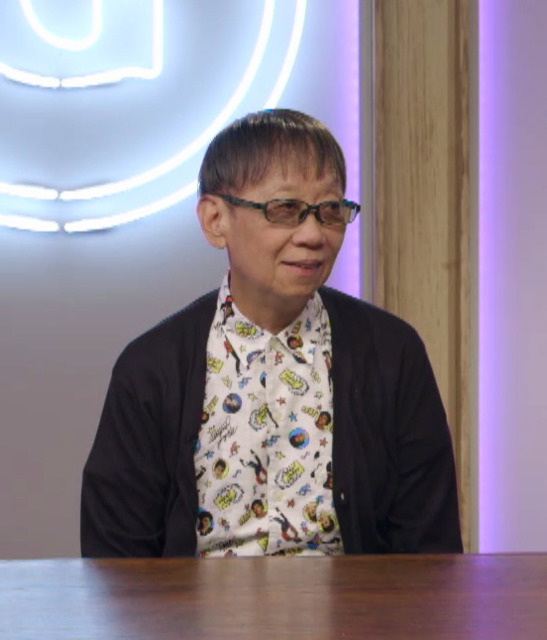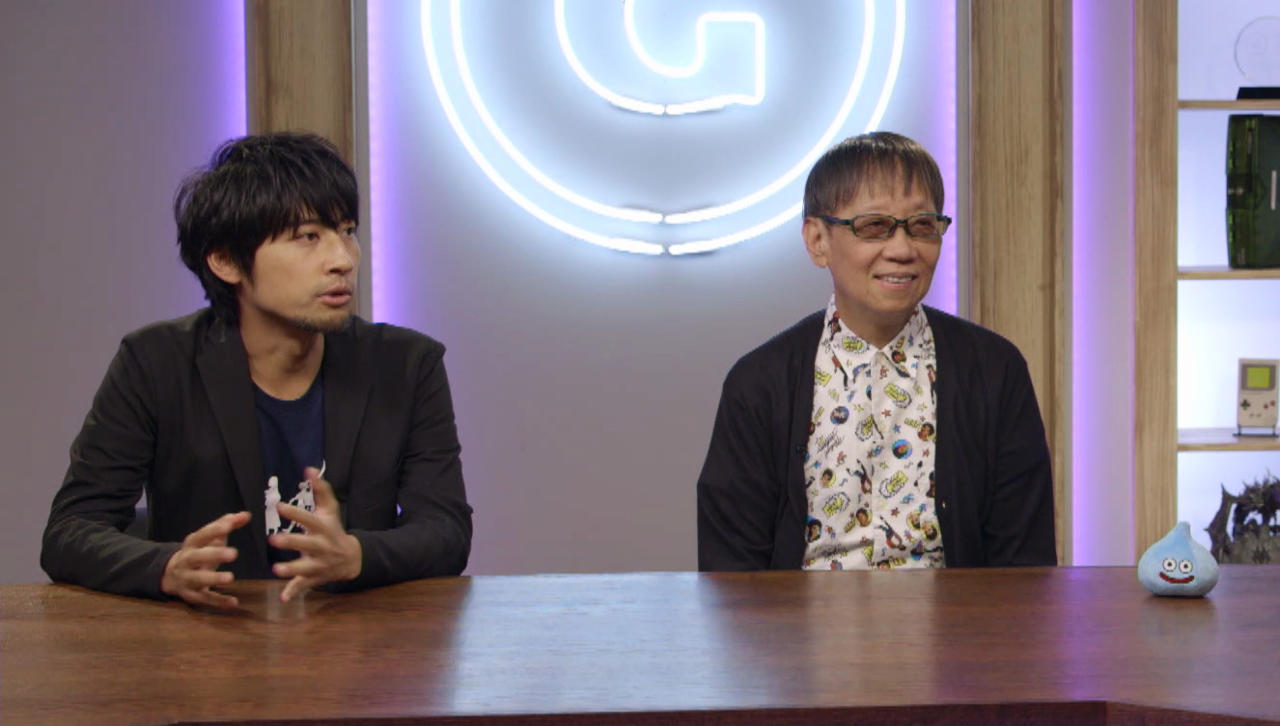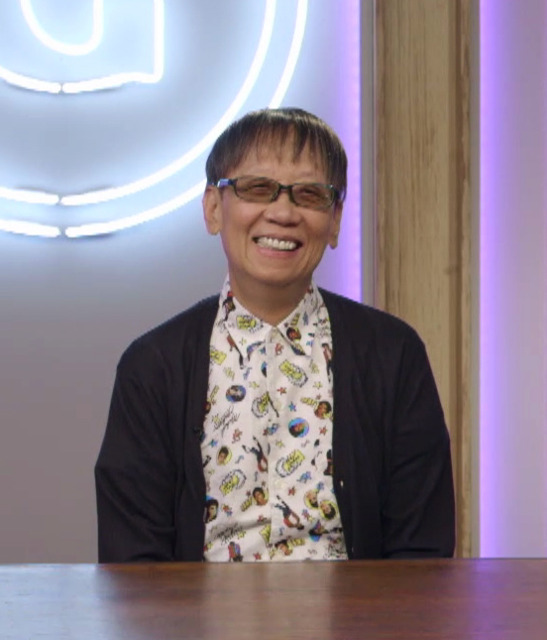Few creatives have had as resonant an impact on video games as Yuji Horii, who over 30 years ago set out to prove that computers and games aren't cold distractions, but opportunities to create lasting memories. He knew the power of storytelling and saw an opportunity to focus it in a new way, and thus Dragon Quest was born. Horii proved his point long ago, with his early work in the mid-'80s forming the basis for the JRPG sub-genre, inspiring countless creators to follow his lead. But Horii remains steadfast to his objective after all these years; Dragon Quest seems to make him happy, and it probably has something to do with the fact that he views it as a way to bring joy to millions.
Dragon Quest 11's director, Takeshi Uchikawa, is living proof of Horii's effect. As a young boy beside his older brother, Uchikawa formed lasting memories of their shared fantasy through Horii's worldbuilding in 1987's Dragon Quest 2. Now, Uchikawa sits beside the man himself to help lead the massive franchise into the future. Getting to this point was his ultimate goal when he started making games at Square Enix, and now that he's achieved it the time is right to give back what Horii gave to him to million of other players in the years to come.
We recently spoke with Horii and Uchikawa about the impact of Dragon Quest on their lives, and how Dragon Quest 11 represents a bridging of ages--not only for its developers, but for players as well, be they longtime fans or first-timers. Considering that the last new, numbered Dragon Quest game to release in the West was Dragon Quest 9 in 2010, there are probably a lot of people on both ends of the spectrum eager to see what Dragon Quest 11 has to offer.
(The following text is the combination of two interview sessions, and has been edited in parts for clarity.)
Dragon Quest 11 has been in development for a long time. How does it feel to be on the other side of such a massive undertaking?
Horii: I'm very thrilled to bring Dragon Quest 11 to North America. We've of course released many in North America in the past but nothing of this scale, so in that sense a lot of the response from fans has made me very excited for the release.
Uchikawa: Of course Dragon Quest 11 is an amazing game, so of course it should receive great reviews (laughs). We've never received that kind of attention before so were really happy to see so many people latching onto it and experiencing it for themselves. We really believe that the traditional aspects that define Dragon Quest, as well as the new features and elements, really come together quite well. It really brings me joy to know that our fans are enjoying the game.

Uchikawa-san, how is it that you came to direct Dragon Quest 11?
Uchikawa: Dragon Quest 9 was the first game in the series that I took part in. I was actually the scenario assistant for Horii-san at that time. So I was working on that for quite some time, also leading up to Dragon Quest 10. The point that changed my career was my time on the Dragon Quest Monsters series. I had a chance to take part of the game design and really work on that aspect of the game, outside of the story.
One of the objectives and goals that I've always had since joining Square-Enix was to someday become the director of a numbered Dragon Quest game. Given the fact that I had an overall experience for game development through Monsters, the company kind of forcefully presented the opportunity to me to become the director of Dragon Quest 11, so I took it on and that's why I'm here today.
Of course there was a lot of pressure, but given that it was one of my goals when I first joined the company, I really did enjoy the process of working on the project as a director, and with Horii-san.
The story I've heard from Horii-san in other interviews is that Dragon Quest 11 is supposed to be a fresh start, but it's also meant to embody the traditions that have been established up until this point. Can you explain the process of paying homage to the past while creating something that's supposed to be the start of a new generation?

Horii: One thing to note about the traditional elements of Dragon Quest...you can see it's turn-based, but it's all about how we showcase the gameplay. Personally, I don't read manuals. If you just jump into Dragon Quest and play, you know what to do. You don't need a manual. You instinctively know what to do.
It's also quite famous that the main character in a Dragon Quest game only ever responds to other characters with a yes or a no, and part of the fun is to showcase the change in the world and the environments. Technological advancements have given us a chance to showcase the world and present it in a more lively manner. The main character still responds in the binary fashion, but the world around him feels more alive.
Uchikawa: From the development side, in terms of new aspects, it definitely comes down to the story. We've brought forth a story that hasn't been told before, and that's the pillar of the development process. From that point, we would consider what past homages to bring into the game and then balance it out.
One thing to note about homages, of course, is those little points within the story can only be picked up by people who know about them, so we didn't want to just rely on that wholeheartedly. We wanted to ensure that there's a sense of stimulus from the new story elements and new aspects in the game. We want to create these new emotional moments that would also resonate with new players. Our process was focused on that.
Are there things you're doing outside of story development to help surprise players and keep the series feeling fresh?
Horii: It is a given that the story always changes, but we do want to introduce surprises through systems as well. With games, it's all about how immersive the experience is, how deeply you can lose yourself within the game. So, I feel like there are still a lot of ideas that we can explore to achieve that, and we will continue to seek those out.
I want to keep making games that help players grow through experiencing the world; the virtual seeping into reality.
So you want to make a Dragon Quest VR game. (laughs)
Horii: That is one idea! But that's not it.
The Complete FALLOUT Timeline Explained! Warhammer 40k: Darktide - Path of Redemption | Update Trailer Is Fallout 76 Good in 2024? SAND LAND - Official Darude Sandstorm Trailer No Rest for the Wicked - Official Steam Early Access Launch Trailer Battlefield 2042 | Frontlines Mode Returns - Time-Limited Event Trailer Honkai: Star Rail - Official Aventurine Trailer | "The Golden Touch" Life Eater - Official Launch Trailer Devil May Cry: Peak Of Combat | Vergil: Count Thunder Returns Gameplay Trailer 21 Details You May Have Missed In Helldivers 2 Stellar Blade - Official "The Journey" Behind The Scenes Trailer | PS5 Games Zenless Zone Zero - Official Koleda Character Teaser Trailer | "Bite At The Site"
Please enter your date of birth to view this video
By clicking 'enter', you agree to GameSpot's
Terms of Use and Privacy Policy
When you look back years from now on Dragon Quest 11, both the game and the development process, what memories do you think will stick with you the most?
Uchikawa: We really built out unique characters for Dragon Quest 11, and in that sense, even if people don't remember the story we feel like the characters will really stick in their minds. The specific individuals that they encounter throughout the world will be something that we think they will look back on and feel nostalgic for.
This is a personal desire for the game, but we really had newcomers and first-time players in mind when making Dragon Quest 11, so we would love it if people jumped in and gave it a shot to learn about the series, and then went back to older Dragon Quest games and experienced them, and then maybe revisit Dragon Quest 11 from a new perspective. That's something I hope people will try.
I've played Dragon Quest 5 over 20 times, and every time I play it I attach new emotions to it. I really hope Dragon Quest 11 is a similar game in that sense.
Horii-san, you're in the middle of a long and interesting career, but I'm wondering if you can think back to the original Dragon Quest. Did you even imagine that it would become as big of deal as it is today?
Horii: It was 32 years ago that I started working on Dragon Quest for the Famicom, and I had no idea at the time of how long the series would live on.
What do you think makes Dragon Quest such an enduring series? Fans have changed, consoles have changed, but the series continues, and in many ways it's remained steadfast since the beginning.
Horii: Going back to that moment in time when we we created Dragon Quest, originally it was created in response to the notion that computers feel a little cold. I wanted to create a warm and inviting world that was easy to understand and accessible, and that created a sense of excitement. That's where it all started.
Fortunately, in Japan, it was received quite well. The majority of children at that time were playing the game, maybe even like 90% of elementary school students. It's not just the content of the game, but I feel like everyone's memory is attached to the environment that they played the game in, so whether that was with their friends or siblings or parents, their experiences are attached to those memories of playing together with the people that they love. I think that's one of the reasons why it has endured for so long.

In that case: Uchikawa-san, what are your earliest memories of playing Dragon Quest?
Uchikawa: My first memories of Dragon Quest is of playing Dragon Quest II with my older brother, who is two years older. He was in charge during all of the story sections of the game, and then he would hand me the controller to do all of the grinding and leveling up around towns. We had these split responsibilities.
One of the prouder moments of playing the game with my brother as a kid was when he would applaud me for purchasing really strong equipment without having been told to do so.
One of my favorite aspect of Dragon Quest is the warmth that you two are describing, the wholesome quality to the series. That does make it feel different from a lot of games today. How do you feel about the current state of the gaming, and how a traditional series like Dragon Quest fits into a world with ever-more serious games and complicated monetization practices?
Horii: I actually don't think about the business side of things very much. I do believe we develop games so that people enjoy those games, and if they do enjoy them then the money will follow. It may be different for Square Enix but that's my thought process.
Yu Miyake (Dragon Quest executive producer): What we're creating doesn't change, it's what the creators wants to develop and what we believe consumers want to play. With regards to how we deploy the content, it's essentially the producer's job to figure out what would be the best way to bring that game to market. In that sense, we do want to consider various options and ways to bring these games to our consumers, but it doesn't change the fact that we are fully backing our creators and bringing their visions to life.
Looking at modern game development from a different perspective, what is your favorite part of working in games today?
Horii: Personally, I really like surprising people. I love the fact that there are so many different ways to deliver surprises to fans thanks to modern technological advancements. I always have fun coming up with new methods.
To give an example, looking back to the Famicom days. Memory was scarce and we could only depict things in a 2D environment, and that was the only expression that we had available to us. But with Dragon Quest 8, with the 3D models and the vast world, you really felt like you could go anywhere. That was something that really excited me.
And you, Uchikawa-san?
Uchikawa: I share Horii-san's opinion, to a certain extent. Aside from surprising people, I want to focus on the ways we connect people together through games. With all of the new types of hardware and network options, the way we interact with each other has changed significantly. I want to keep that at the top of my mind when developing future games, and I hope to generate new ways to bring people together.

Just as an anecdote, with Dragon Quest 11 we are already in a world where information can be shared immediately through Twitter, for example, and being able to see the honest feedback and response from fans, as well as the artwork they've created or just screenshots that they've captured, almost in real time, is great for us as creators.
Horii-san, how did you get feedback from fans before the adoption of the internet?
Horii: In those days, I was a writer for Shonen Jump. I would often receive calls at the office, but then people would also take surveys and write comments and responses to me. Aside from that, it was sales, honestly, and interview requests--that told me how well the series was doing.
The series has obviously done quite well for itself and when a lot of people think about Dragon Quest, you are the first person that comes to mind. How do you wrap your head around your celebrity, or your position at the helm of something so massive?
Horii: I tend to shy away. I like to make games intently, in private, so I don't usually get the sense that I'm famous. But then a game comes out and I start doing interviews and then it hits me: maybe I am something!

Does that feel strange?
Horii: I'm getting used to it!
If you could go back in time and give your younger self one piece of advice, what would that be?
Horii: Once the series really started to take off, there was a bit of pressure that I had to fight off while figuring out what to do next. If I were to go back and give myself any advice, it would be to "take it easy."
Uchikawa: I wonder how things would have turned out if you had taken it easy!
Given the range of experience between you two, how do you navigate your working relationship while developing the future of Dragon Quest?
Horii: I believe that we have a great relationship. There are limitations to what you can do when thinking about things by yourself. A lot of good ideas come from discussions with other people.
Uchikawa: To add to that, as I mentioned earlier, I've been playing Dragon Quest games since I was a child. Now I have the opportunity to work with Horii-san who is still working on the games I love. Respect for Horii-san comes first. In developing these new Dragon Quest games, obviously the scale is increasing, so if there are any aspects that Horii-san doesn't have the time to look into, I like to be there to support him in anyway I can and get his approval for the final steps. It's to ensure that we still get to develop games that are by their nature Horii-san-like, and in his nature. That's how I view our collaboration.
What is a "Horii-san game"?
Uchikawa: A game that Horii-san creates! (laughs)
Horii-san: (laughs) It's really hard to define. We get asked that question a lot. I'm don't know what it is, specifically. It's a general feel. I'm always looking at games from the player's perspective, and if anything could be boring, I won't hesitate to take that out to keep things interesting. I always try to be flexible to keep the player's experience at the top of mind.

